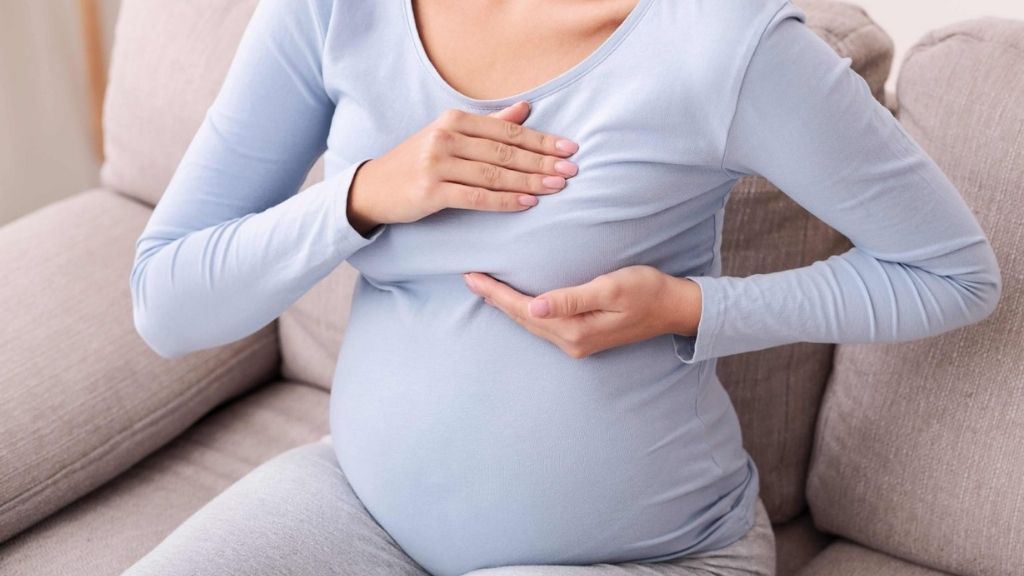
Table of Contents
Tender and sore breasts during pregnancy are often the earliest symptom of having a little human inside you. Expectant women have reported feeling some discomfort around or at 6 weeks of being pregnant. If you are one of them, you must have wondered what causes sharp breast pain during pregnancy and how you can relieve it? Here’s everything you need to know about breast pain during pregnancy.
What Causes Pain Under Breast During Pregnancy?
Your body starts producing pregnancy hormones (prolactin, progesterone, and estrogen) after the egg is fertilized. These hormones stimulate your breasts and in response, the milk glands inside them grow to prepare to feed your newborn.
Breast pain during pregnancy is the pain of your breasts preparing themselves for lactation. The discomfort comes and goes over the entire course of your pregnancy. Most pregnant women experience swelling of the tissues during their 1st trimester which makes their breasts tender and sore. All that ruckus in your breasts is due to your ever-changing hormones and body chemistry during pregnancy. Here are the behind-the-scenes of your breasts filling with milk:
- The pregnancy hormones human chorionic gonadotropin (hCG) and progesterone increase the blood volume in your entire body and in response your breasts get plump.
- These pregnancy hormones change the pigment cells or melanocytes in your body which triggers the color of your nipples to change. The pale color sloughs away and darker tones rise to the surface. Your nipple will become more pronounced so that your baby can see them easily. If you are having sore nipples during pregnancy, these changes are to be blamed.
- If you experience sharp pain under the right breast or overall sharp pain in the breast during the third trimester, the pregnancy hormones (progesterone and estrogen produced by the placenta) activate the milk ducts in your breasts. The ducts get large and start producing and storing colostrum (the early form of breastmilk). This is also the reason behind the sharp pain in the breast during pregnancy as the cells stretch out to make room.
All these bodily changes during pregnancy can cause your breasts to feel prickly: they will be uncomfortable, tender, and sore to the touch. Luckily the pain subsides as pregnancy progresses (after the few early weeks).
What Relieves Breast Tenderness During Pregnancy?
The sharp pain in your breast during pregnancy will ease eventually as your journey progresses. Meanwhile, here are a few things you can do to relieve the discomfort:
Wear a Supportive Bra
During pregnancy, your breasts need more support than ever so pack away that lace underwear and get some full-coverage bras. These will lift your breasts and take pressure off the area. You may find that a sports bra or a larger-size bra helps. It might be a bit painful to go braless at night so wear a comfortable sleep bra to get into those peaceful slumbers.
Create a “No Touch” Zone
Your full breasts are going to be attractive to your partner but touching and adding pressure will only make breast pain unbearable while you are pregnant. Care for your pregnancy breasts with care until the soreness subsides.
Opt for Loose-fitting Clothes
Clingy tops on your full breasts might be cute but they will be constructed. The inner seams of the tops could aggravate your extra-sensitive breasts. Wear flowy clothing that will not irritate or rub your expanding breasts.
Try a Cold Compress
Sharp pain in breasts during pregnancy can be eased by cold compresses. Lay a towel on your chest and apply an ice pack to the sore areas. Even a frozen bag of peas or fruits will work well.
Take Warm Showers
The sharp pain in the breast during the third-trimester pregnancy (or second trimester) may not subside after a cold compress (not everyone responds to cold therapy). In that case, you could try spending some extra time in a steam bath or a shower. The heat will help relax your muscles and ease the tension.
Doctor-approved Pain Relief
If the soreness is unbearable even after following some basic remedies, you can ask your doctor if you can take Tylenol. Consume medicine for pain relief only if your OB-GYN approves it (you don’t want unnecessary complications).
Breast Pain After Pregnancy: What Are The Causes?
You might think you have escaped breast pain after you have delivered our munchkin. Sadly, this is not the case as most women have painful, full, rock-hard breasts after childbirth when they are lactating. Usually 3 or 4 days after the birth the pain sets in again. This is called engorgement and you might even feel discomfort or pain when your baby feeds.
How Long After Giving Birth Will Breast Pain Last?
Breast pain after pregnancy goes away on its own when you feed your newborn and/or after the body gets to decide how much milk needs to be produced. You might also experience pain during feeding and that sorts itself over time. However, if you are experiencing persistent pain, you should (or can) see your doctor.
The Bottom Line: Breast Pain During Pregnancy
Sharp breast pain during pregnancy and after giving birth is a normal occurrence and you need not fret over it much. Typically, this pregnancy pain subsides on its own over time. The pain indicates certain bodily changes in your breast in preparation for the arrival of your little one. The preparation of the milk ducts for lactation, increase in blood volume in your body, and the release of pregnancy hormones are some of the causes of sharp breast pain during pregnancy.
You can try applying some cold compresses to the sore regions of your breasts. If this doesn’t soothe your pain, you can switch to steam baths or showers. If the pain seems unbearable, you may ask your OB-GYN to give you pain-relieving medications such as Tylenol. Do not self-medicate as it might cause complications in your pregnancy.





